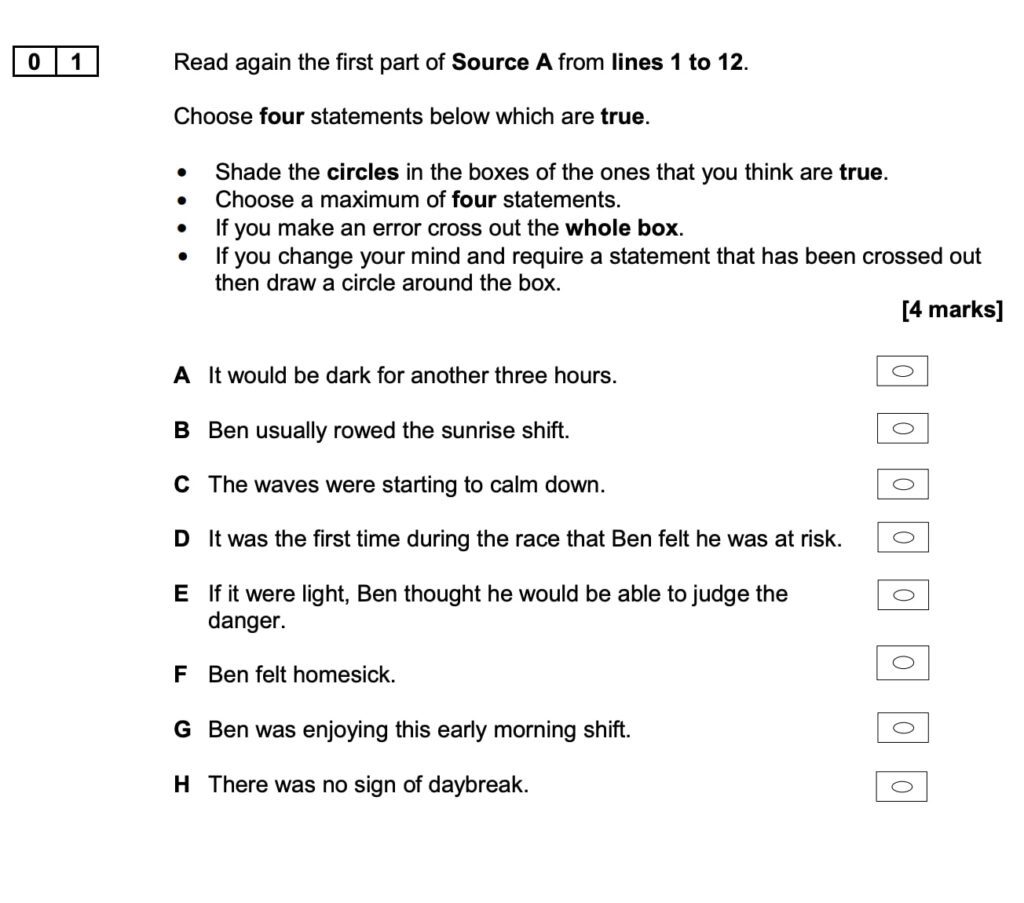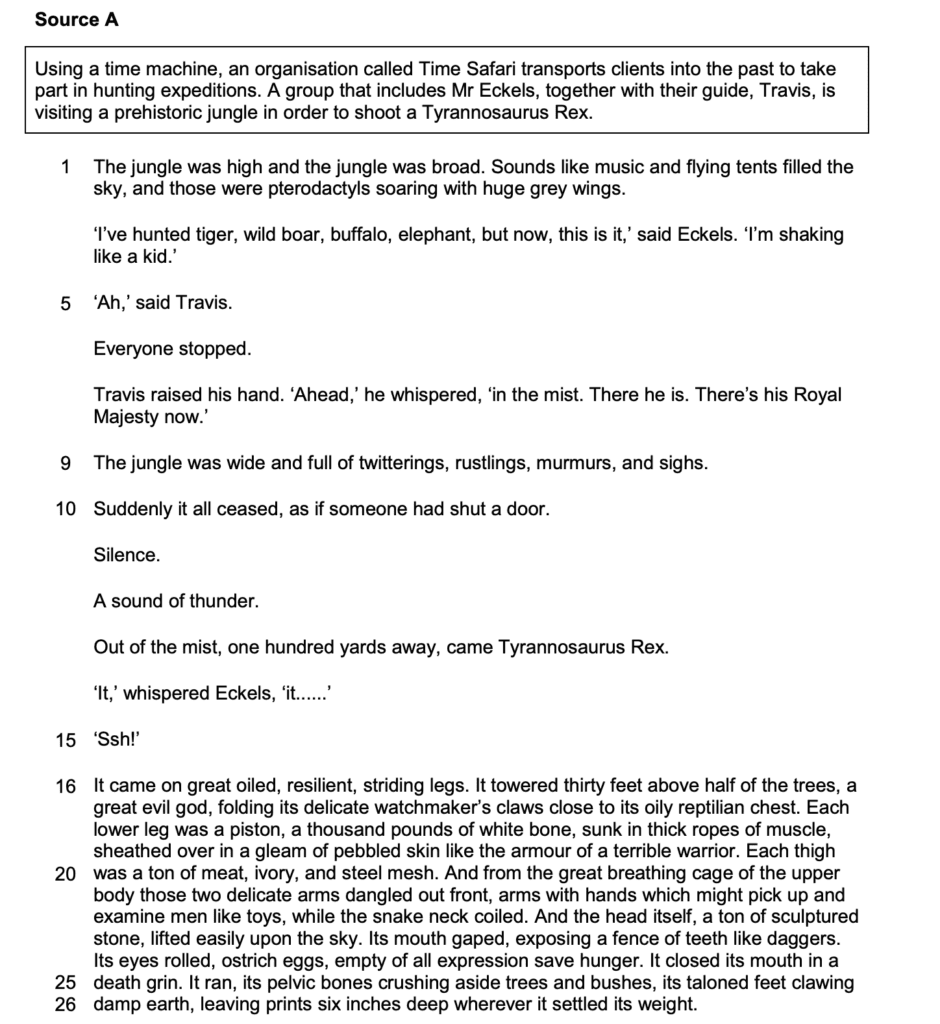GCSE English Language – Everything You Need to Know
The GCSE English curriculum has seen significant transformations, reflecting evolving educational standards and requirements. These modifications pertain to both the course content and the assessment methods. Divided into English Language and Literature, the curriculum focuses on enhancing students’ abilities in various domains. The English Language component is designed to develop proficiency in reading, writing, speaking, and listening. In contrast, English Literature concentrates on building a deeper understanding of prose, poetry, and drama.
GCSE English language is mandatory and even if you fail, you are required to resit it until you turn 19.
GCSE English is a critical qualification for university admissions in the UK – some having their own minimum grade for GCSE english.
What does the English Language GCSE consist of?
The English Language GCSE is structured to assess a range of skills across several components. Here’s a breakdown of what the course typically consists of:
- Reading Comprehension:
- Fiction and Non-Fiction Texts: Students are required to read and understand various texts, including excerpts from novels, articles, and reports.
- Analysis: They must analyse how language is used to create effects, convey meanings, and inform or persuade readers.
- Writing Skills:
- Creative Writing: Tasks might involve writing stories, descriptions, or narrative pieces that demonstrate originality and imaginative flair.
- Transactional Writing: This includes writing letters, speeches, articles, and essays that require a formal, persuasive, or argumentative style.
- Spoken Language:
- Presentation: Students must prepare and deliver a presentation on a given topic, which is followed by a question-and-answer session.
- Speaking Skills: The assessment focuses on clarity, fluency, and the organisation of ideas, as well as the ability to engage with listeners through effective communication.
- Grammar and Vocabulary:
- Technical Accuracy: Students are assessed on their ability to use standard English effectively, demonstrating a strong command of grammar, punctuation, and vocabulary.
- Assessment Format:
- Examinations: Typically, there are two exam papers—one focusing on reading and writing related to fiction texts, and the other on non-fiction texts.
- Coursework: Some boards may include coursework or controlled assessment tasks.
- Oral Component: The spoken language assessment is usually conducted separately and may be endorsed on the GCSE certificate as an additional qualification.
The course is designed to develop students’ ability to communicate effectively in both spoken and written forms and to understand and respond to what they hear and read.
GCSE English Language Exam

Examination Structure of GCSE English Language
The GCSE English Language examination is designed to assess students’ proficiency in reading, writing, and spoken language. Understanding the structure of these exams is crucial for effective preparation.
Format of the Exams
1. Written Papers GCSE English Language typically involves two written papers, each crafted to test a distinct set of skills:
- Paper 1: Explorations in Creative Reading and Writing
- Section A (Reading): Focuses on one literature fiction text. Students are required to answer questions that test their comprehension, interpretative, and analytical skills.
- Section B (Writing): Tests creative writing skills. Students may be asked to write a narrative or compose a descriptive piece based on a given prompt or image.
- Paper 2: Writers’ Viewpoints and Perspectives
- Section A (Reading): Involves comparing two non-fiction texts from different periods. Students need to synthesise and compare the perspectives and themes presented.
- Section B (Writing): Requires students to produce a written response, such as an article, speech, or letter, expressing a particular viewpoint or argument.
Each paper typically lasts between 1.5 to 2 hours, demanding both speed and precision from the students.
2. Spoken Assessment The spoken language component of the GCSE English Language evaluates the oral skills of the students. It is assessed separately and includes:
- Presentations: Students may be asked to present on a given topic, followed by answering questions from the teacher.
- Role Plays: In some cases, students participate in role-playing exercises to demonstrate their ability to adapt language and tone for different contexts.
- Discussions: Students might engage in a structured discussion, requiring them to express and justify their opinions clearly and effectively.
While the spoken language assessment does not contribute to the final grade, it is compulsory and students receive a pass, merit, or distinction grade.
Types of Questions and Tasks
Written Papers
- Multiple-Choice Questions: Often used to test specific comprehension skills.
- Short Answer Questions: Require concise responses focused on specific aspects of the texts.
- Extended Responses: Students must craft detailed analyses or persuasive pieces, demonstrating depth of understanding and effective writing style.
Spoken Assessment
- Impromptu Speeches: Students might be asked to speak spontaneously on a provided topic, testing their ability to think and articulate their thoughts quickly.
- Prepared Speeches: These allow students to demonstrate more structured and polished oratory skills on a pre-selected topic.
How Many English GCSE Papers are There?
GCSE English has 2 exam papers. See past papers here.
Overview of GCSE English Paper 1
Paper 1 of the GCSE English Language exam typically focuses on creative reading and writing skills. It involves reading a literary text and then answering questions to demonstrate understanding and interpretation. The writing section usually requires composing a creative piece, such as a story or descriptive narrative, which allows students to showcase their creativity, linguistic prowess, and grasp of narrative techniques. This paper assesses both reading comprehension and the ability to engage imaginatively with language.
Overview of GCSE English Paper 2
Paper 2 of the GCSE English Language exam typically centres around non-fiction texts and transactional writing. This paper usually includes comprehension tasks involving one or more non-fiction texts, such as articles or essays. The questions are designed to test students’ abilities to understand, analyze, and compare these texts. The writing component often requires students to produce a piece of transactional writing, like a letter or an article, focusing on clear, coherent communication and the effective use of language for a specific purpose. This paper assesses students’ abilities to navigate and respond to real-world texts and scenarios.
GCSE English Will No Longer Be Handwritten Under Exam Board Plans
Starting in 2025, Pearson Edexcel will allow GCSE English students to type their exam answers. This change aims to simplify editing and marking processes, and is currently under review by the Department for Education and Ofqual. While enhancing accessibility, concerns are raised about the potential decline in handwriting skills. Experts emphasise the importance of maintaining a balance between digital and handwriting competencies. The shift to digital assessments is part of a broader trend among UK exam boards, with implications for educational equity and technological familiarity among students.
The Key Topics in GCSE English Language
The GCSE English Language course is structured to cultivate a wide range of literacy skills, focusing on aspects that are crucial for both academic progression and real-world communication. Below, we delve into the primary areas of study within this subject.
Reading Comprehension

A vital part of the English Language GCSE is reading comprehension. This component requires students to demonstrate their ability to read, understand, and critically evaluate various types of texts. These may range from literary extracts and modern fiction to non-fiction and media texts.
Understanding and interpretation
Students must show that they can identify the main ideas, themes, and arguments in a given text. This understanding extends to identifying the writer’s intentions and the techniques used to convey them.
Analysis and evaluation
This further extends to analysing how language, structure, and form contribute to the effectiveness of a text, and evaluating its impact on the reader.
Writing Skills
Together with the GCSE speech and also with GCSE speech ideas, which assesses a student’s ability of spoken language, writing skills are equally important in the GCSE English Language examination, and the focus here is on both creative and functional writing. Here are a few steps to successfully tackling this task:
How to Write an Article for the GCSE English Language Exam
The ability to write compelling articles is a crucial skill assessed in the GCSE English Language exam, especially within the framework of Paper 2, which focuses on non-fiction texts and transactional writing. Crafting an article for this exam requires not only a clear understanding of the topic but also an ability to engage the reader through effective language use and persuasive techniques. Here’s a step-by-step guide to help you excel in writing articles for the GCSE English Language exam.
Understand the Purpose
An article aims to inform, argue, persuade, or entertain. Before you start writing, identify the purpose of your article. Are you discussing a pressing issue, presenting an argument, or informing your audience about a recent development? Understanding your article’s purpose will guide your tone, structure, and content.
Know Your Audience
Tailor your language, style, and the points you emphasise to match the interests and understanding level of your intended readership. Whether you’re writing for peers, younger students, or a general audience, your approach should resonate with them. This alignment increases the impact of your message and the effectiveness of your article.
Plan Your Structure
A well-structured article is easier to follow and more persuasive. Start with a compelling introduction that hooks your reader and clearly states the article’s purpose. The main body should present your points in a logical order, each supported by evidence or examples. Conclude with a strong closing paragraph that reinforces your main message and, if applicable, calls to action.
Use Persuasive Techniques
Employ a range of persuasive techniques to strengthen your argument and engage your readers. These can include:
- Rhetorical questions to make readers think and engage with your perspective.
- Statistics and facts to add credibility.
- Direct address to create a connection with the reader.
- Anecdotes to illustrate points and make your argument more relatable.
- Varied sentence lengths to maintain interest and emphasise key points.
Maintain a Formal Tone
While the tone should be engaging, remember to keep it formal and professional, avoiding slang and colloquialisms unless they serve a specific purpose. This formality lends authority to your writing and respects the exam setting.
Edit and Revise
After completing your first draft, take the time to revise and edit your work. Look for ways to improve clarity, coherence, and the persuasive impact of your argument. Check for grammatical errors and ensure your language choices contribute to a strong, convincing article.
Practise with Past Papers
Familiarise yourself with the format and expectations of the GCSE English Language exam by practising with past papers. Analyse the feedback to understand what examiners are looking for and apply this insight to your writing.
Incorporating these strategies into your preparation for the GCSE English Language exam will not only improve your article writing skills but also enhance your overall proficiency in English. Remember, effective writing takes practice, so seize every opportunity to refine your craft.
Creative Writing
In creative writing tasks, students have the opportunity to exhibit their imaginative skills by crafting narratives or descriptions, experimenting with language, and demonstrating an understanding of different writing techniques.
Functional Writing
On the other hand, functional writing tasks may involve writing letters, articles, speeches, or essays. Here, students need to demonstrate their ability to present a clear argument, maintain a consistent point of view, and use persuasive techniques.
Spoken Language (Oral Communication)
Lastly, the Spoken Language component of GCSE English Language assesses students’ abilities in delivering presentations, participating in discussions, and responding to questions effectively. It is an endorsement that reflects a student’s competence in spoken English and is reported separately from the 9-1 grading scale.
Common Difficulties Encountered in GCSE English Language

Mastering the nuances of the English language can be challenging, even for the most dedicated students. In this section, we highlight some of the most common difficulties encountered by students when studying GCSE English Language.
Grasping Abstract Concepts
English Language GCSE involves understanding abstract ideas like themes, motifs, or writer’s intentions. Some students may find it challenging to go beyond the literal meaning of texts and delve into these underlying concepts.
Analysing Language Techniques
Identifying and analysing various GCSE engish language techniques used by writers is a key element of this subject. Students often find it difficult to decipher the subtle ways in which writers use techniques like metaphors, symbolism, or irony to enhance their storytelling.
Crafting High-Quality Written Responses
Students are required to produce structured, coherent, and persuasive written responses. Achieving a balanced response that is detailed yet concise can be a challenging feat. Some may struggle with maintaining a consistent tone or point of view, or with organising their ideas effectively.
Time Management in Examinations
Exams often pose the challenge of time management. With a need to balance reading comprehension, analysis, and written responses within a limited timeframe, students may struggle to allocate their time effectively, which can affect their overall performance.
Nervousness during Spoken Language Assessment
Despite being comfortable in everyday spoken English, some students might experience nervousness or stage fright during their Spoken Language assessment. This can impact their performance, especially if they are not used to speaking formally or presenting in front of others.
Recognising these challenges is the first step towards overcoming them. With targeted support and appropriate revision resources, students can build confidence, improve their skills, and excel in their GCSE English Language studies.
Sample GCSE English Language Exam Questions
Exam practice is a crucial part of effective revision. Here, we present a sample question from a GCSE English Language paper, including the associated reading extract. We also explore common mistakes students make and provide tips on how to approach such questions.
Question:
Read the following extract from a novel. In this extract, the main character, Emma, is visiting a place from her childhood.
Insert:
“Emma stood at the edge of the forest, looking at the dilapidated house she once called home. The paint was peeling off, shutters hanging loosely from the windows, and the once vibrant garden was now overgrown with weeds. She could almost hear the echo of laughter from the summer days spent there, a sharp contrast to the quiet that now hung in the air. The house stood as a stark reminder of times long past, its state mirroring the abandonment it had suffered.”
Now, answer the following question:
- How does the writer use language to convey Emma’s feelings towards the house? Support your answer with evidence from the extract. (15 marks)
Common Mistakes:
A common mistake when answering such a question is to focus solely on what the text says, rather than how it says it. For instance, a student might write about Emma feeling sad because the house is in disrepair, without discussing the specific language used to convey this feeling.
Another common error is not providing sufficient evidence from the text to support points. Students often make assertions without directly referencing the text.
How to Approach the Question:
To answer this question effectively, it’s essential to focus on the language techniques used by the author and explain how these techniques contribute to the impression of Emma’s feelings.
For instance, you might discuss the use of imagery: “The paint was peeling off, shutters hanging loosely from the windows” to convey a sense of decay, mirroring Emma’s feelings of sadness and abandonment. Also, the use of contrast “She could almost hear the echo of laughter from the summer days spent there, a sharp contrast to the quiet that now hung in the air” underscores the change and loss Emma feels.
Remember to include specific quotations from the text to support your points, explain your interpretations clearly, and link your comments directly back to the question, focusing on Emma’s feelings.
Question:
Imagine you are a journalist tasked with writing a feature article for a local newspaper on the theme of ‘The Importance of Reading Books in the Digital Age.’
Your article should:
- Discuss the current trend of digital reading (e.g., e-books, online articles).
- Argue for the continued importance and benefits of traditional book reading.
- Persuade your readers to invest time in reading physical books.
Remember, your article should be engaging, compelling, and structured, and should effectively use a variety of persuasive techniques. (40 marks)
Common Mistakes:
One common mistake in this type of question is to neglect the structure of the article. Students sometimes start writing without a clear plan, leading to a lack of coherence or a strong argument.
Additionally, students often forget to write persuasively, instead just providing information or opinions without using persuasive techniques or rhetorical devices.
How to Approach the Question:
Begin by planning the structure of your article. An effective structure might include an engaging introduction, a discussion of the trend towards digital reading, arguments for traditional book reading, and a strong conclusion that persuades your reader to invest in reading physical books.
Remember to vary your sentences for effect, use persuasive language techniques (like rhetorical questions, statistics, or anecdotes), and maintain a formal tone appropriate for a newspaper article.
Ensure that your points are clearly and logically presented, and each paragraph has a clear focus. Use transition words to link your ideas and arguments together.
Keep your audience in mind: As you are writing for a local newspaper, consider the interests and concerns of local residents. How can reading traditional books benefit them? How might you appeal to both younger and older demographics in your writing
Effective Revision Resources for GCSE English Language
To excel in GCSE English Language, it’s crucial to supplement your study with a variety of revision resources. From textbooks to online platforms, apps, and even YouTube channels, there’s a wealth of material designed to support you in your studies. Here are some of the top resources you can use:
Websites
- BBC Bitesize – This website offers comprehensive resources on all topics covered in the GCSE English Language syllabus, with easy-to-understand explanations, practice questions, and study tips.
- SparkNotes – While primarily known for its literature guides, SparkNotes also provides valuable resources for understanding language and grammar, key for improving your English language skills.
- The Student Room – This forum is a goldmine for past papers, study tips, and advice from fellow students and educators.
Apps
- GCSEPod – This app features short podcasts on a range of GCSE subjects, including English Language. It’s perfect for revision on the go.
- Quizlet – Quizlet allows you to create your own flashcards or use sets created by others. It’s particularly helpful for revising language techniques and vocabulary.
YouTube Channels
- Mr Bruff – This channel provides an extensive collection of videos on all aspects of GCSE English Language, from understanding complex concepts to exam walkthroughs and analysis of sample answers.
- Stacey Reay – An English teacher who shares helpful video tutorials and tips for the GCSE English Language exams.
Books
- CGP GCSE English Language Revision Guide – Known for its straightforward and humorous approach to revision, this guide breaks down the key topics, and includes practice questions and model answers.
- AQA GCSE English Language: Targeting Grades 5-9 – A comprehensive revision guide tailored to students aiming for higher grades in the AQA specification.
- Pearson Revise AQA GCSE (9-1) English Language Practice Papers Plus – Perfect for practising exam-style questions and honing your exam technique.
Using a combination of these resources can significantly boost your understanding and confidence in GCSE English Language. Remember, the most effective revision involves actively engaging with the material, whether that’s by completing practice questions, making notes, or discussing topics with others.
The Benefits of GCSE English Language Tuition
Mastering the GCSE English Language and structure techniques can be challenging. The depth of understanding required, the range of skills to be honed, and the pressure of examination performance can sometimes prove daunting for students. However, it’s in these scenarios that the benefits of a dedicated tuition service become abundantly clear.
Personalised Learning
Private tutoring allows for learning that is specifically tailored to the student’s needs. Tutors can provide additional support in areas where a student may be struggling, which can be especially useful in GCSE English Language, where key topics cover a vast range. The bespoke approach enables tutors to adapt teaching methods to each student’s unique learning style, ensuring comprehension and progression.
Confidence Building
The one-on-one nature of tutoring also encourages students to express their doubts and ask questions without fear of embarrassment. This interaction can significantly improve a student’s confidence, not just in English Language, but across other subjects too, as the skills learnt are often transferable.
Exam Preparation
Tutors are well-versed in the curriculum and understand what examiners look for in GCSE English Language papers. They can help students familiarise themselves with the exam format, work on their time management skills, and guide them through sample questions, enhancing their exam technique.
Consistent Feedback
Frequent feedback is another key advantage of tuition. Regular assessment of a student’s work allows both the student and the tutor to keep track of progress, identify areas for improvement, and fine-tune strategies to ensure success in the exams.
Edumentors: The Go-To for English Language Tuition
Understanding the challenges faced by students and parents alike, Edumentors offers an online platform for students to connect with experienced GCSE English tutors. Edumentors’ tutors are selected for their expertise, experience and a demonstrated ability to effectively communicate with students.
Concluding Thoughts
In the pursuit of academic excellence, every child embarks on a unique journey. It’s a journey that requires not just knowledge absorption, but also the cultivation of critical thinking, self-expression, and a deep-seated belief in one’s abilities. While this journey is personal, it is not meant to be travelled alone.
Education has the power to shape futures, and the GCSE English Language course, with its far-reaching skill set, provides an essential foundation. However, we acknowledge that the path to mastering this subject can be fraught with challenges. In these moments, having a guide, a mentor, can make all the difference.
Edumentors is transforming education, It isn’t just about aiding students through the intricacies of the GCSE English Language course; it’s about inspiring them to rise above their perceived limitations, to embrace the thrill of learning, and to confidently conquer their academic goals.
Our GCSE English tutors, students from top UK universities, are armed with the knowledge, the experience, and the passion to guide students on this journey. They bring to each session an understanding of the complexities of the English language and an eagerness to share their love for the subject.
These mentors don’t merely provide answers; they spark curiosity, encourage questions, and nurture the growth of each student. They take the time to understand each individual’s unique learning style, needs, and aspirations, thus fostering an environment where students can thrive.
FAQ’s
What is covered in English Language?
The English Language course typically covers a broad range of skills and topics aimed at enhancing students’ command of the language, both in understanding and producing it. Here are the key areas commonly covered:
- Reading Comprehension: Students learn to interpret, analyze, and evaluate texts from various genres and periods, understanding how meaning is shaped by language choices.
- Writing Skills: The course focuses on improving students’ ability to write clearly and effectively for different purposes and audiences. This includes both creative writing and more formal, structured writing like essays and reports.
- Grammar and Vocabulary: A strong emphasis is placed on mastering grammar and broadening vocabulary to improve both spoken and written language skills.
- Spoken Language: Students develop skills in spoken English, including presentations, speeches, and other forms of oral communication.
- Language Varieties: Understanding different dialects, sociolects, and registers of English used in various contexts and cultures.
- Language Theories: Some courses may also delve into the theoretical aspects of language, including linguistics and the study of phonetics, semantics, and discourse.
- Language Change: Exploration of how the English language has evolved over time and the factors that influence language change.
These components aim to develop a comprehensive skill set in English language usage, preparing students for a range of communication tasks and examinations.
What's the difference between English Literature and English Language GCSE?
The difference between English Literature and English Language GCSE lies primarily in their focus and content:
- English Language GCSE:
- Focus: This course primarily concentrates on the use and understanding of English as a language. It covers reading comprehension, writing skills, spoken language, and the technical aspects of language, such as grammar and vocabulary.
- Content: Students analyse a variety of texts to understand how language is used to communicate effectively. They also engage in creative and transactional writing, develop spoken English skills, and study the nuances of English usage in different contexts.
- English Literature GCSE:
- Focus: This course focuses on the study of literary texts from various genres and periods. It explores themes, characters, and the artistic techniques used by authors.
- Content: The curriculum includes the detailed study of novels, plays, and poetry. Students analyse texts to understand deeper meanings, interpret themes, and evaluate the impact of literary techniques. Classic works from authors like Shakespeare, as well as modern literature, are often part of the syllabus.
Key Differences:
- Skill Development: English Language GCSE develops practical language skills for effective communication, while English Literature GCSE enhances analytical skills through the interpretation and critique of texts.
- Assessment: English Language assessments typically involve tasks related to reading comprehension, various forms of writing, and sometimes a component of spoken language. English Literature assessments focus on essay writing and textual analysis based on the set literary works.
Both subjects complement each other, with English Language providing the foundational skills necessary for the articulate expression and analysis required in English Literature.
Is GCSE English hard?
The perception of whether GCSE English is hard can vary significantly from student to student, depending on their strengths, weaknesses, and interests. Here are some factors to consider:
- Skills Required:
- GCSE English Language focuses on comprehension, writing, and spoken skills, which requires a good grasp of vocabulary, grammar, and the ability to analyze texts.
- GCSE English Literature involves the study of novels, poetry, and plays, requiring analytical skills to interpret themes, characters, and literary techniques.
- Challenges:
- Language Skills: Students who struggle with spelling, grammar, or vocabulary might find the language aspects challenging.
- Literary Analysis: Those who find it difficult to interpret and discuss literature might face challenges with English Literature.
- Volume of Reading: Both courses require reading a significant amount of material, which can be daunting for some students.
- Support and Preparation:
- Teacher Support: Effective teaching and support can make a substantial difference in understanding and mastering the material.
- Practice: Regular practice, especially with past papers and sample questions, can significantly improve confidence and ability.
- Additional Resources: Leveraging extra resources like online tutorials, study groups, and revision guides can help clarify difficult concepts.
- Interest and Engagement:
- Students who enjoy reading and writing tend to find English more accessible and engaging, which can lead to better outcomes.
In summary, while GCSE English can be challenging due to its broad curriculum and the skills required, adequate preparation, and a proactive approach to learning can mitigate these difficulties. It’s important for students to engage with the course content actively and seek help whenever needed to overcome any hurdles.








